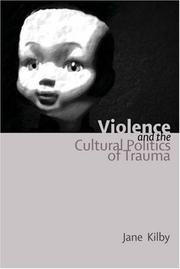| Listing 1 - 6 of 6 |
Sort by
|

ISBN: 074865304X 1281252255 9786611252250 0748628835 9780748628834 9781281252258 9780748653041 6611252258 0748618163 9780748618163 Year: 2007 Publisher: Edinburgh : Edinburgh University Press,
Abstract | Keywords | Export | Availability | Bookmark
 Loading...
Loading...Choose an application
- Reference Manager
- EndNote
- RefWorks (Direct export to RefWorks)
During the late 1970's and 1980's speaking out about the traumatic reality of incest and rape was a rare and politically groundbreaking act. Today it is a ubiquitous feature of popular culture and its political value uncertain. In Violence and the Cultural Politics of Trauma, Jane Kilby explores the complexity and consequences of this shift in giving first-hand testimony by focusing on debates over recovered memory therapy and false memory syndrome, the spectacle of talk show disclosures, discourses of innocence and complicity as well as the aesthetics and affect of shock. In counterpoint to the...
Rape in mass media. --- Sexual abuse victims. --- Incest --- Rape --- Assault, Criminal (Rape) --- Assault, Sexual --- Criminal assault (Rape) --- Nonconsensual sexual intercourse --- Sexual assault --- Offenses against the person --- Sex crimes --- Sexual intercourse --- Consanguinity --- Female sexual abuse victims --- Sexual violence victims --- Victims of sex crimes --- Victims of crimes --- Mass media --- Social aspects. --- Incest in mass media. --- Forced sexual intercourse --- Forced sexual penetration --- Penetration, Forced sexual --- Sexual intercourse, Forced --- Sexual intercourse, Nonconsensual --- Sexual penetration, Forced

ISBN: 9780748628834 9780748618163 Year: 2022 Publisher: Edinburgh Edinburgh University Press
Abstract | Keywords | Export | Availability | Bookmark
 Loading...
Loading...Choose an application
- Reference Manager
- EndNote
- RefWorks (Direct export to RefWorks)
Book
ISBN: 9780415854450 9781135010010 9781135009991 9781135010003 Year: 2014 Publisher: New York : Routledge,
Abstract | Keywords | Export | Availability | Bookmark
 Loading...
Loading...Choose an application
- Reference Manager
- EndNote
- RefWorks (Direct export to RefWorks)
Celebrating the twentieth anniversary of the groundbreaking Testimony, this collection brings together the leading academics from a range of scholarly fields to explore the meaning, use, and value of testimony in law and politics, its relationship to other forms of writing like literature and poetry, and its place in society. It visits testimony in relation to a range of critical developments, including the rise of Truth Commissions and the explosion and radical extension of human rights discourse; renewed cultural interest in perpetrators of violence alongside the phenomenal commercial success of victim testimony (in the form of misery memoirs); and the emergence of disciplinary interest in genocide, terror, and other violent atrocities. These issues are necessarily inflected by the question of witnessing violence, pain, and suffering at both the local and global level, across cultures, and in postcolonial contexts. At the volume's core is an interdisciplinary concern over the current and future nature of witnessing as it plays out through a 'new' Europe, post-9/11 US, war-torn Africa, and in countless refugee and detention centers, and as it is worked out by lawyers, journalists, medics, and novelists. The collection draws together an international range of case-studies, including discussion of the former Yugoslavia, Gaza, and Rwanda, and encompasses a cross-disciplinary set of texts, novels, plays, testimonial writing, and hybrid testimonies. The volume situates itself at the cutting-edge of debate and as such brings together the leading thinkers in the field, requiring that each address the future, anticipating and setting the future terms of debate on the importance of testimony.
Psychic trauma in literature. --- Testimony (Theory of knowledge) --- Witnesses in literature. --- Recollection (Psychology) --- Memory --- Psychic trauma and mass media. --- LITERARY CRITICISM / General. --- SOCIAL SCIENCE / Violence in Society. --- Social aspects. --- Witnesses. --- Truth commissions. --- Human rights.
Book
ISBN: 9781845456931 Year: 2010 Publisher: New York : Berghahn Books,
Abstract | Keywords | Export | Availability | Bookmark
 Loading...
Loading...Choose an application
- Reference Manager
- EndNote
- RefWorks (Direct export to RefWorks)
Collective memory --- Memorialization --- War memorials --- Terrorism --- Political violence --- Genocide --- War and society. --- Political aspects. --- Social aspects.
Book

ISBN: 1845458478 9781845458478 1782380817 1845456939 Year: 2010 Publisher: New York Oxford
Abstract | Keywords | Export | Availability | Bookmark
 Loading...
Loading...Choose an application
- Reference Manager
- EndNote
- RefWorks (Direct export to RefWorks)
Memory studies has become a rapidly growing area of scholarly as well as public interest. This volume brings together world experts to explore the current critical trends in this new academic field. It embraces work on diverse but interconnected phenomena, such as twenty-first century museums, shocking memorials in present-day Rwanda and the firsthand testimony of the victims of genocidal conflicts. The collection engages with pressing 'real world' issues, such as the furor around the recent 9/11 memorial, and what we really mean when we talk about 'trauma'.--
Collective memory --- Memorialization --- War memorials --- Terrorism --- Political violence --- Genocide --- War and society. --- Society and war --- War --- Sociology --- Civilians in war --- Sociology, Military --- Cleansing, Ethnic --- Ethnic cleansing --- Ethnic purification --- Ethnocide --- Purification, Ethnic --- Crime --- Violence --- Political crimes and offenses --- War monuments --- Art and war --- Memorials --- Monuments --- Military parks --- Soldiers' monuments --- Memorialisation --- Collective remembrance --- Common memory --- Cultural memory --- Emblematic memory --- Historical memory --- National memory --- Public memory --- Social memory --- Memory --- Social psychology --- Group identity --- National characteristics --- Political aspects. --- Social aspects. --- Social aspects
Digital

ISBN: 9781845458478 Year: 2010 Publisher: New York; ; Oxford Berghahn Books
Abstract | Keywords | Export | Availability | Bookmark
 Loading...
Loading...Choose an application
- Reference Manager
- EndNote
- RefWorks (Direct export to RefWorks)
| Listing 1 - 6 of 6 |
Sort by
|

 Search
Search Feedback
Feedback About UniCat
About UniCat  Help
Help News
News